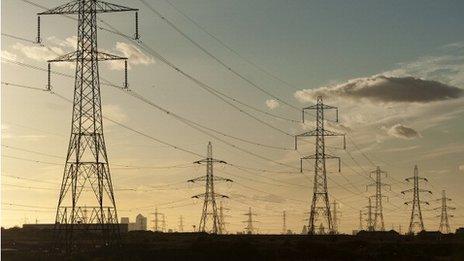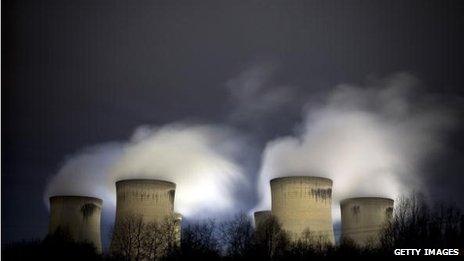Budget 2014: Moves to cut business energy costs
- Published

The energy sector has been central to political debate recently
Measures to help cut energy costs for businesses, worth up to £7bn, have been announced by the chancellor.
The moves include a freeze on the Carbon Price Floor (CPF), one of the green levies on our energy bills, which has been pushing bills higher.
There will be also be new exemptions from green taxes for firms that use a lot of energy.
But one company said the moves will unnerve investors and increase the costs of building new power plants.
And RenewableUK, the trade and professional body for the UK wind and marine renewables industries, said the changes would "chill the mood" of some investors in clean energy projects.
Lower bills
The CPF sets the amount of tax that polluting firms pay to emit carbon. As the measure requires polluters - such as coal and gas-fired power plants - to pay more to operate, it increases the cost of electricity.
Some estimates suggest it would have put between £30 and £50 on our annual energy bills by 2020.
The chancellor now says it will be frozen at £18 per tonne of CO2 emitted in 2016-17. It was intended to reach £30 by 2020.
Shares in Drax, one of the UK's biggest independent power generators, rose following the announcement. Drax produces electricity from burning coal and biomass.

Drax power station will benefit from the new measures
In a related move, fuels used in Combined Heat and Power plants to generate electricity will be exempt from the CPF.
There were also specific measures to tackle the energy costs of firms like steelmakers and the cement and chemicals industries. These are known as Energy Intensive Industries (EII's).
As part of a new £1bn plan, the firms will now be exempt from the cost of two green measures, the Renewables Obligation and Feed-in Tariffs, which support renewable generation.
A previous scheme to help with their energy costs has also been extended for a further four years. The treasury says EII's will now be compensated for all government policy that supports low carbon and renewable investment up until 2019-20 and will save an average firm up to £19m.
'Much-needed'
The measures were broadly welcomed by the main business groups.
The business lobby group the CBI said that it had pushed hard for this "significant and much-needed energy package". It said the measures will help keep manufacturing jobs in the UK, while underpinning vital investment in new energy.
The manufacturers' organisation, the EEF, said that the measures showed that the government recognised the serious competitive issues at stake from rising energy prices.
Gareth Stace, head of climate and environmental policy at EEF, said "The freezing of the Carbon Price Floor will translate into greater clarity for manufacturers' energy bills through to 2020 and provide much needed investment certainty.
"The Renewables Obligation compensation for energy intensive industries will also help to level the playing field these companies need to compete effectively with others around the globe and, keep production here in the UK."
'Unbridgeable gap'
But change to the CPF was criticised by the renewables sector. The measure was introduced just two years ago. It was intended to be a fundamental plank of the government's energy policy.
The UK's largest independent renewable energy developer, RES, said that freezing the CPF further undermined the stability promised by the government as the cornerstone of the new Energy Act.
Gordon MacDougall. its chief operating officer, said "It will unnerve investors already spooked by a rapid succession of energy policy changes, raise the cost of capital for British businesses building new power plants and deter the new institutional investors needed to renew the UK's ageing energy infrastructure, all of which will cost consumers in the long term."
Other independent generators have also warned that such a move could lead to more gas plants being mothballed and potentially increase the risk of blackouts.
They argue that the CPF was designed to increase the cost of burning coal and that freezing it would allow polluting coal plants to operate longer, preventing some gas plants from competing.
There had been speculation that the Budget would look at ways to cut manufacturer's energy bills.
Energy Minister Michael Fallon had recently warned that "without further action on energy costs, the competitiveness gap between Europe and the US is becoming unbridgeable".